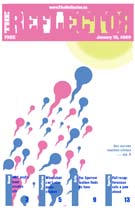
| — Frances Widdowson and Albert Howard Frances Widdowson is a professor in the Department of Policy Studies at Mount Royal College. Albert Howard has worked as a consultant for government and native groups, and is currently an instructor and Director of Programs at the Kennedy College of Technology in Toronto. |
|
| At the forum we were hoping to provide an overview of our arguments in Disrobing the Aboriginal Industry: The Deception Behind Indigenous Cultural Preservation. We were looking forward to scholarly criticisms from Dr. James Frideres and Dr. Eldon Yellowhorn so as to further clarify our position. Unfortunately, however, Yellowhorn and Frideres chose instead to showboat their own questionable opinions, such as the importance of “turtle island” mythology for understanding human origins, the idea that stampeding bison over cliffs reflects an aboriginal ecological consciousness, and the irrelevant assertion that native languages are “verb based” rather than “noun based.” The lack of scholarly engagement was especially prevalent in the case of Frideres, who elected to focus on matters of form: the book’s subheadings were “too cute” and we did not capitalize the adjectives “aboriginal” or “native.” More disturbingly, Frideres attacked our research with the false accusation that most of our references relied on sources like the Globe and Mail and Chatelaine (our book actually contains 59 references to the Globe and Mail and only one reference to Chatelaine out of 851 endnotes, most of which involve scholarly sources). These disingenuous tactics reflect the paucity of intellectual opposition to our views. Disrobing the Aboriginal Industry focuses on two themes: the economic interests of the group that benefit from maintaining aboriginal dependency and social dysfunction (i.e. the non-native lawyers and consultants who make up the “Aboriginal Industry”); and the deception this group uses to justify a socially destructive policy direction. Our book argues that research is distorted so as to disavow the developmental gap that exists between aboriginal traditions and modern requirements. And, as a result of purposely denying this gap, many aboriginal people continue to need the Industry’s “help.” Of these themes, the idea about unevenness in cultural development is by far the most controversial. After all, a number of aboriginal commentators, including Jean Allard, Calvin Helin and Patrick Brazeau, have already identified the existence of the Industry. The notion that there is evolution in culture, on the other hand, is strongly opposed, especially by the New Left. It is maintained that evolutionary assumptions are “offensive” because they supposedly classify less developed cultures as “inferior.” The recognition that pre-contact aboriginal societies lacked technologies such as iron, the wheel and a written language, and that this contributed to their eventual economic and political subordination, is seen as justifying the terrible harm that resulted from colonization. This moral opposition then often morphs into the argument that cultural evolutionary theories are outmoded and scientifically invalid, and therefore need not be taken seriously; all cultures, according to this relativist position, should be considered to be equally developed; just “different.” But the moral outrage that has been levelled against notions of cultural development has impeded the scientific evaluation of the content. It has become very difficult for social scientists to investigate these matters when research is perceived, before the fact, as an indication of closet racism or colonialist sympathy. Our book attempts to honestly investigate developmental differences in culture, and disregards the self-serving intimidation tactics that have made taboo all discussion of this subject. Identifying the factors that have enabled one group to oppress another obviously is not justification of that oppression. It also is not racist, as differences in culture are recognized (following Jared Diamond) as the result of accidental environmental factors. In fact, as is pointed out in our book, theories of cultural evolution influenced the thought of Karl Marx and Frederick Engels. These historical materialists maintained that increasing cooperation and the productivity of labour directed humanity’s evolution. The New Left’s focus on aboriginal “difference,” on the other hand, is a reactionary philosophy that inhibits the recognition of our common humanity. This is consistent with the New Left’s postmodern turn to “identity politics” and away from class analysis. |
|
| Professor under fire | |
| Cigarette ban hits MRC | |
| Aboriginal cultural gap a reality | |
| Authors use ‘flimsy knowledge’ | |
| Letter to the editor |
| Sex survey results | |
| Supplying the high | |
| Reflect this! | |
| 'Fire of spirit' |
| Fox Sparrow flies to Calgary | |
| 1111 pushes art to the next level | |
| CD reviews |
| Cougars Connection | |
| The legacy that is Sutter |
 |
